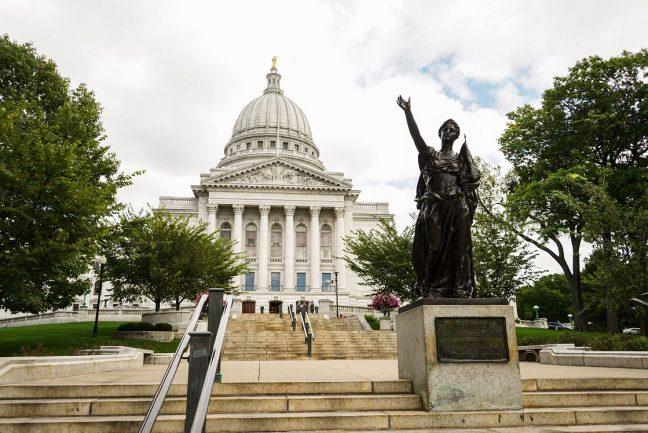Students growing up in the United States are often raised to understand certain cultures — typically the ones most prominent in their environment — at the expense of others.
The emergence of a variety of cultures in school curriculums is incredibly helpful. Being educated on different religions and nationalities and learning about their ideologies and traditions helps prepare students and provides them the necessary background to fully understand different social climates around the world. Additionally, it provides a holistic understanding of all religions, strengthening students’ cultural competence living in the United States.
The Wisconsin legislature recently passed a mandate that took effect this school year, requiring that all schools must incorporate the Holocaust genocide into their history curriculums.
The Holocaust was a mass genocide of European Jews during World War II, spanning from 1933 — when Adolf Hitler was appointed Chancellor of Germany — to 1945, when World War II officially ended. The Holocaust resulted in the death of over six million and the imprisonment of around five million European Jews. This genocide, along with countless others in world history, is incredibly relevant to current conversations regarding cultural competence in the United States.
Wolf population data reveals shortcomings in outdated management plans
Ordinarily, this would be a beneficial mandate considering many teenagers in the United States can be ignorant regarding minorities and the cultural climate they exist in. This can be seen through examples of racially motivated police brutality in the 21st century and the ongoing antisemitism that’s prevalent all around the United States.
Due to societal polarization, many people frequently view social media posts that align with their beliefs, making it incredibly difficult for them to see a different perspective. People often refuse to consider other mindsets which proves to be a major problem. Not reading news articles and social media posts that narrate different perspectives fuels a confirmation bias that conceals younger audiences in their personal short-sighted box of the world and its history.
The mandate states that schools in Wisconsin must “educate” about the Holocaust and “other genocides,” but doesn’t specify a specific curriculum or plan they must follow, giving schools the power to decide what aspects of the Holocaust they want to focus on. While some schools may decide to highlight the detailed history of Judaism in Europe and the timeline leading up to World War II, others will focus less on the narrative of displaced Jewish families and concentration camps, making it difficult to truly understand what was wrong with Nazi Germany.
A spokesperson from the Department of Public Instruction of Wisconsin said schools can decide to take vastly different amounts of time teaching Holocaust history and other relevant genocides. This technically fulfills the Holocaust curriculum requirement, which is problematic because, for topics like these, short, isolated lessons aren’t enough. A lack of specific guidelines defeats the purpose of attempting to educate and improve students’ cultural competence.
Nurses’ agreement with UW Health leaves unionization unsettled
Essentially, there is a right and wrong way to act as a historian. The right way and the only way to help strengthen the cultural competence of American students is to narrate the story from the perspective of the minority population, highlighting the experiences of prisoners of war, survivors of Auschwitz and other concentration camps and the descendants of displaced Jews.
In order to understand all perspectives of genocide, students need to learn that some actors — including the United States — were bystanders, letting an event like the Holocaust occur and continuing to perpetuate antisemitic behaviors. But, the United States wasn’t always just a bystander in history. At times, the United States served as an active aggressor, such as with the Japanese internment camps during WWII, where people of Japanese descent were taken from their homes and incarcerated.
This is another event in history that needs to be examined and taught in schools. Students need to understand that their ancestors took part in another one of history’s horrific genocides. This, along with other more current genocides, like in Rwanda and Darfur, are global massacres that, through complacent policies, the United States has played a role in perpetuating. This is the definition of ignorance.
Through this ignorance, the United States is to blame for being a bystander, and in other cases, a participant. In order to partially rectify this, there needs to be strict guidelines concerning the Holocaust mandate and policies implemented to strengthen education regarding genocide. We should be analyzing WWII in its full context to fully understand the impacts of a genocidal event.
These are important questions to address to help strengthen Wisconsin’s cultural competence. There is a specific story to be told, looking past facts and figures and focusing on personal horrific recollections. Students should be learning the full story — how it felt to be a Jewish person during that time, how it felt to be displaced, discriminated against and ultimately erased from cultural history.
Students need to empathize with Jews from the Holocaust to understand the antisemitic and genocidal policies of Nazi Germany and to see how cyclical trends operate today. Implementing a solid curriculum, highlighting untold stories and perspectives and educating Wisconsinites about genocide can help ensure history doesn’t repeat itself.
Ineffective education threatens to encourage ignorance. Schools in Wisconsin and the United States should take the initiative to properly educate future generations on the history of all genocides to guarantee that history stays in the past.
Sasha Vulakh ([email protected]) is a freshman majoring in international studies and psychology.




















